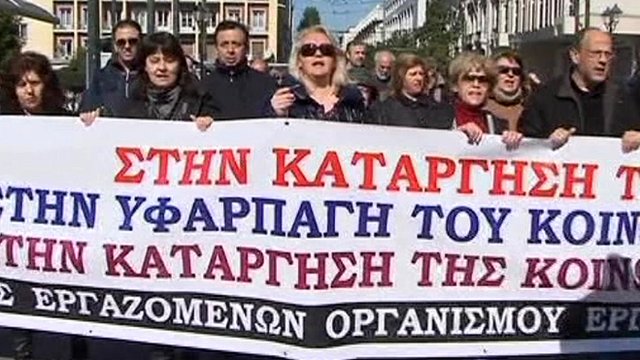You are here: Home » Feature , News and Media » Greek bailout 'elements in place', says France's Baroin
All the elements are in place for agreement on a new bailout loan for Greece, the French finance minister has said, ahead of a meeting of eurozone finance ministers in Brussels.
Athens needs the 130bn euros (£110bn; $170bn) in order to avoid bankruptcy in mid-March, when a huge repayment on its governmental debt must be made.
French Finance Minister Francois Baroin said Greece could not wait any longer.
On Sunday Greek PM Lucas Papademos went to Brussels to try to clinch the deal.
US Treasury Secretary Timothy Geithner said the US was encouraging the International Monetary Fund (IMF) to support the bailout, but it is not clear how much the IMF will contribute.
The rescue plan would also write off 100bn euros of debt, with private lenders accepting a 70% reduction in what Greece owes them.
Eurozone doubts
Mr Baroin said he would plead for the deal at Monday's meeting of eurozone finance ministers.
"All the elements are in place... both with the bankers, private sector creditors, and public sector creditors, the states and central banks," he told Europe 1 radio.
Five straight years of recession have left Greece with a debt that is more than 160% of its Gross Domestic Product (GDP).
Eurozone leaders and the IMF said in October that Greece's debt should be reduced to the more sustainable level of 120% of GDP by 2020.
Successive rounds of austerity measures, demanded by the EU, the IMF and the European Central Bank - Greece's international creditors - have failed to restore growth and have provoked clashes between protesters and police.
Measures passed by parliament last week set out 3.3bn euros' worth of cuts to salaries and pensions, and health and defence spending.
Several thousand people protested in Athens on Sunday against further cuts agreed to by Mr Papademos' cabinet on Saturday - but the numbers were far reduced from the tens of thousands who protested last week.
Some eurozone finance ministers doubt Greece's commitment to its spending pledges and want strong mechanisms to ensure its debts are paid.
It is not yet clear how the eurozone intends to keep the pressure on Greece to ensure it fulfils its commitments, says the BBC's Europe editor, Gavin Hewitt.
And, he adds, there are doubts that even with the bailout Greece will be able to reduce its debt to a sustainable level.
Funds from elsewhere may need to be found.
On Wednesday, the eurozone finance ministers said Greece had made "substantial progress", but demanded more detail, including a full timeline for implementing the measures.
Jean-Claude Juncker, head of the so-called Eurogroup, said more work was needed to strengthen oversight of how Greece would implement its austerity plans.
This would be the second bailout for Greece. A first rescue fund of 110bn euros in 2010 was not enough to avert the crisis
source:http://www.bbc.co.uk/news/world-europe-17092964
Category: Feature , News and Media
Related posts:
If you enjoyed this article, subscribe to receive more great content just like it.
Subscribe to:
Post Comments (Atom)






0 comments:
Post a Comment